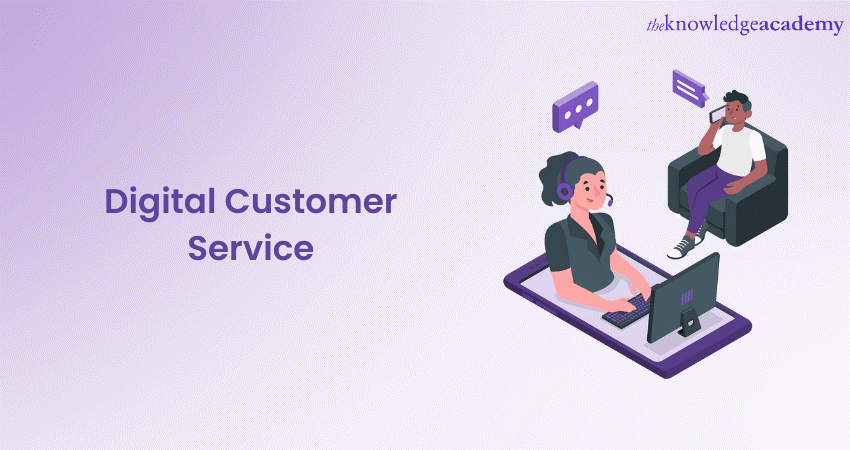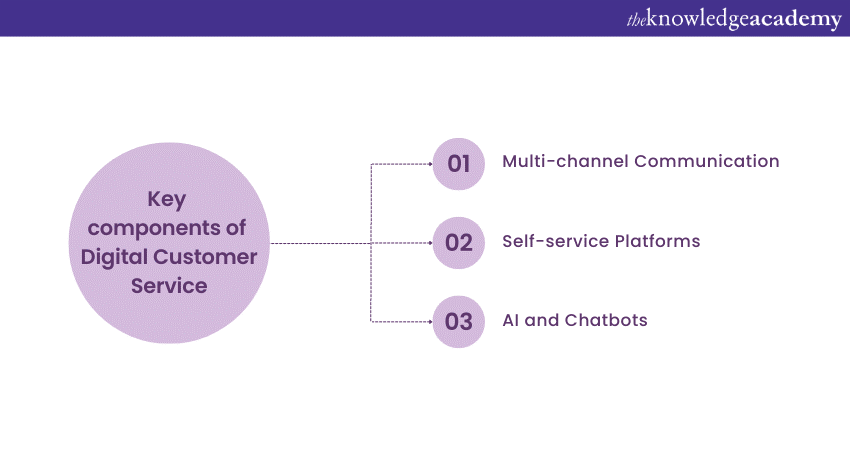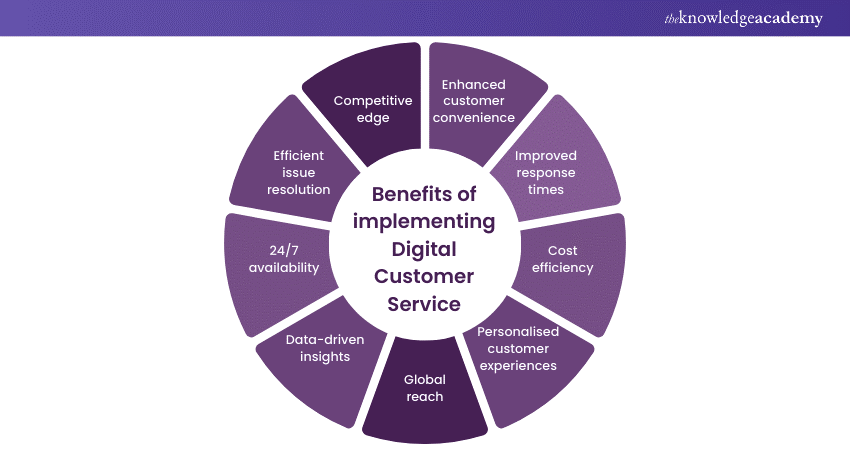We may not have the course you’re looking for. If you enquire or give us a call on 01344203999 and speak to our training experts, we may still be able to help with your training requirements.
Training Outcomes Within Your Budget!
We ensure quality, budget-alignment, and timely delivery by our expert instructors.

Customer Service has transformed into a dynamic and tech-driven experience. Digital Customer Service (DCS) has emerged as a pivotal component of businesses striving to deliver seamless support and engage with customers across various digital platforms. According to Accenture, companies that value customer satisfaction and ratings experience 3.5 times higher revenue growth. This growth can be achieved using digital tools for Customer Service. Want to know how? Read this blog to explore What is Digital Customer Service, its features, benefits, strategies, challenges, and future trends.
Table of contents
1) What is Digital Customer Service?
2) Key components of Digital Customer Service
3) Benefits of implementing Digital Customer Service
4) Challenges in Digital Customer Service implementation
5) Conclusion
What is Digital Customer Service?
Digital Customer Service (DCS) is a way businesses engage and assist customers over digital platforms. It encompasses a comprehensive set of strategies, tools, and technologies for customer support and assistance through various digital channels. These channels include websites, social media platforms, email, live chat, mobile apps, and more. Unlike traditional Customer Service methods that were primarily phone-based, DCS leverages the internet's and digital communication's power to deliver efficient and personalised interactions.
The evolution of Customer Service from its early days at call centres to the digital era has been significant. Customers today expect more than just problem resolution; they seek seamless experiences and real-time interactions.
Digital Customer Service has emerged as a direct response to this shift, incorporating technological advancements to provide timely, convenient, and practical support across many digital touchpoints.
In an age of ubiquitous smartphones and online connectivity, DCS is crucial for meeting customer expectations. By offering support through the channels customers prefer, businesses demonstrate their commitment to staying accessible and responsive. This enhances customer satisfaction and contributes to building strong relationships, fostering brand loyalty, and gaining a competitive edge in the digital marketplace
Key components of Digital Customer Service
The key components of Digital Customer Service collectively enhance engagement, efficiency, and personalised support, shaping modern Customer Service strategies. Let's have a quick look at each one of them:

Multi-channel Communication
At the core of Digital Customer Service lies the concept of Multi-channel Communication, allowing companies to connect with customers. Users can leverage different digital mediums such as social media, email, live chat, and mobile apps.
Self-service Platforms
Self-service Platforms empower customers to find solutions independently. These platforms, including FAQs, knowledge bases, and online forums, streamline issue resolution and reduce the load on support agents. They cater to customers who prefer self-reliance and enable quick problem-solving, improving overall customer experience.
Artificial Intelligence (AI) and Chatbots
AI-driven Chatbots automate routine interactions, providing instant responses and guiding users. Integrating AI enables predictive analytics for more personalised interactions. At the same time, Chatbots enhance efficiency, reduce response times, and ensure prompt customer assistance, contributing to positive engagement.
Transform your business relationships with CRM Training and boost customer satisfaction today. Join our Customer Relation Management Training today!
Benefits of implementing Digital Customer Service
Implementing Digital Customer Service brings forth a range of benefits that cater to both businesses and customers. Here are the advantages of embracing DCS:

a) Digital Customer Service offers customers the flexibility to engage with businesses at their preferred times and through their favoured digital channels, leading to higher satisfaction levels.
b) Digital channels allow businesses to provide swift responses, reducing customer wait times and enhancing the perception of responsiveness.
c) Integration of automation tools like AI and Chatbots reduces the need for a large support team, resulting in significant cost savings over time.
d) Leveraging data analytics, DCS enables businesses to tailor interactions based on customer behaviours and preferences. This leads to more meaningful and memorable experiences.
e) Digital Customer Service removes geographical limitations, allowing enterprises to reach out to a worldwide audience and broaden their clientele.
f) The data collected from digital interactions provides valuable insights into customer trends, pain points, and preferences. This allows businesses to refine their strategies.
g) DCS guarantees 24/7 accessibility, enabling customers to request help at any time, thereby boosting customer allegiance.
h) Automation and self-service platforms enable quick issue resolution, contributing to higher customer satisfaction rates.
i) Businesses that excel in Digital Customer Service gain a competitive advantage by meeting modern customer expectations and staying ahead in the digital marketplace.
Unlock success with our Strategic Planning And Thinking Course – chart your path to a brighter future.
Challenges in Digital Customer Service implementation
While DCS offers numerous benefits, its implementation is posed with several challenges. Here are some hurdles businesses may face when adopting DCS:
a) Technology integration: Integrating various digital platforms and tools seamlessly can be complex. Incorporating these tools may require careful planning and execution to ensure a smooth customer experience.
b) Maintaining the human touch: Striking a balance between automation and personalised human interactions is essential to prevent customers from feeling disconnected or frustrated.
c) Customer resistance to automation: Some customers may prefer traditional human interactions over automated responses. This can lead to resistance or scepticism towards AI-driven support.
d) Employee training: Equipping staff to effectively use new Digital Customer Service technologies and tools requires training, potentially causing initial disruption in operations.
e) Data privacy and security: When customer data is gathered and kept, it becomes essential to establish strong measures for data privacy and security. This is vital for creating and upholding customer confidence.
f) Consistency across channels: Offering consistent experiences across various digital channels can be challenging, as variations can lead to confusion or frustration among customers.
g) Adapting to change: Transitioning from traditional Customer Service methods to DCS requires cultural and operational shifts, which may encounter resistance from employees and management.
h) Real-time responsiveness: Customers expect immediate responses in the digital realm; thus, maintaining swift and accurate real-time responses can be demanding.
i) Monitoring and quality control: Regularly monitoring and ensuring the quality of automated responses, chatbot interactions, and self-service platforms is vital to prevent errors or misinformation.
j) Technology upgrades: As technology evolves, businesses must continuously invest in updates and upgrades to stay current, leading to ongoing financial and resource investments.
Unlock your full potential with our personalised Personal Development Training – empower yourself for success today!
Conclusion
Digital Customer Service is a vital shift in how businesses connect with customers. It offers convenience, efficiency, and personalisation. Despite challenges, embracing DCS paves the way for better customer experiences and business growth in the digital age.
Elevate your Customer Service game with our Exceptional Customer Service Training – unlock the skills to build strong customer relationships.
Frequently Asked Questions

Digital Customer Service enhances user experience by providing instant support, personalised interactions, and seamless omnichannel communication. Automated processes and data-driven insights contribute to quicker issue resolution, fostering customer satisfaction and loyalty

Choosing the right Customer Service Software involves assessing your needs and considering scalability, user-friendliness, and integration capabilities. Prioritise features like ticket management, knowledge base, and analytics. Seek a solution aligned with your business goals and adaptable to evolving customer Service requirements

The Knowledge Academy enhances global learning with a vast selection of over 30,000 online courses, accessible in more than 490 locations across 220 countries. This expansive reach ensures accessibility and convenience for learners worldwide.
Our diverse Online Course Catalogue covers 17 essential categories, complemented by a wealth of free educational Online Resources. These resources include up-to-date News, informative Blogs, tutorial videos, interactive webinars, and collections of Interview Questions. Furthermore, professionals looking for personalised education can take advantage of TKA's customisable Course Bundles, crafted to enrich and optimise the learning journey.

The Knowledge Academy's Knowledge Pass, a flexible prepaid voucher system, offers the freedom to join in courses over a 12-month period. Start your limitless learning adventure with us and embrace education that knows no bounds.

Discover an array of Personal Development Courses at The Knowledge Academy, featuring specialised Organisational Skills, Emotional Intelligence Training, Time Management Training, etc. Designed for different skill levels, our courses provide the necessary technical expertise to learn How to Become a Product Reviewer.
Whether you're starting out or looking to upgrade your Skills, immerse yourself in our Business Skills Blog for further understanding and expertise. Embark on a journey with us to elevate your Personal Development Skills!
Upcoming Business Skills Resources Batches & Dates
Date
 Exceptional Customer Service Training
Exceptional Customer Service Training
Fri 31st Jan 2025
Fri 4th Apr 2025
Fri 13th Jun 2025
Fri 22nd Aug 2025
Fri 24th Oct 2025
Fri 12th Dec 2025







 Top Rated Course
Top Rated Course



 If you wish to make any changes to your course, please
If you wish to make any changes to your course, please


